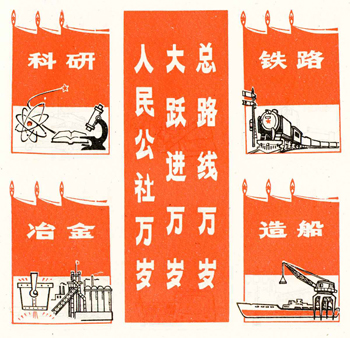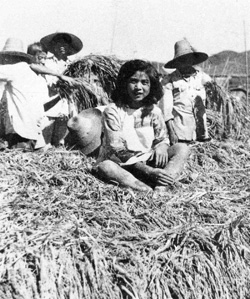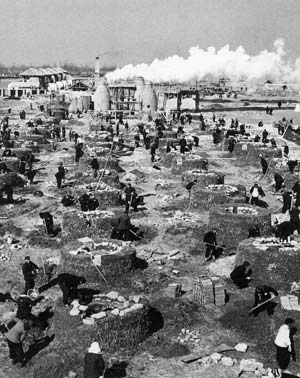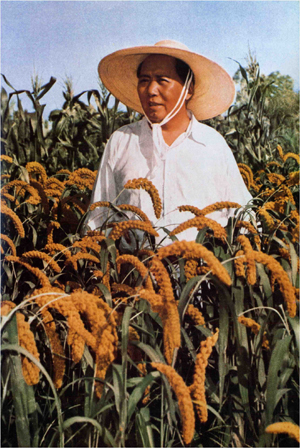|
||||||||
|
FEATURES1959 & its Aftermath: New Years PastTwo oral history interviews by Sang YeTranslated and annotated by Geremie R. Barmé Great Leap era cartoon art. Source: Long Bow Archive Given the hysterical gluttony that is today the main feature of Spring Festival (Chinese New Year) celebrations, it is salutary to reflect on what two people, one from rural China, the other from a major metropolis, say about the not-so-distant past following on from the disastrous Great Leap Forward. The following paired interviews by the oral historian Sang Ye were translated from his 1999 book 1949, 1989, 1999, Hong Kong: Oxford University Press. An edited English version of that work appeared in 2006 under the title China Candid: the People on the People's Republic, Berkeley: University of California Press. For reasons of length, this material could not be included in that book. These interviews were translated by the editor although Miriam Lang made many useful editorial and stylistic suggestions.—The Editor. 1961: The CountrysideIn 1960, the calamitous effects of Mao Zedong's 'General Line for the Building of Socialism'[1] were compounded by natural disasters and the Soviet Union's demand for the repayment of loans. China experienced what the authorities euphemistically called 'a temporary period of national economic difficulty' which produced some eight million economic refugees. Starvation and its attendant diseases resulted in some thirty million 'unnatural deaths.' In 1995, he was the head of an agricultural implement factory in Xushui County, Hebei Province, that employed twenty workers. Excerpt from Morning Sun, Boston: Long Bow Group, 2003. Courtesy: Long Bow Group Download mp4 files of the above clip [2.7 MB]I was at an agricultural high school in 1960. It must have been my second year, though we weren't doing much studying. They'd only just revived the agricultural high school system when the hunger began. When the communes were first set up, it was real communism. The mess hall was great. We got to eat things made from wheat flour every day, and they were always slaughtering pigs for us. For a while it seemed that they were telling the truth and we were going to enter heaven. No one would have believed you if you had suggested that the Communist Party had got it all wrong. There would have been real outrage. They said that 'Communism is heaven, and the communes are the bridge that will take us there.' We felt like we were crossing that bridge, could heaven really be far away? Lenin had declared that communism was soviets plus electricity. The Soviets were about the workers and peasants taking control. Well, that had already happened in China, and the communes were setting up power stations. This had to be the realization of communism! The hype was incredible. They said that in a few years every village would be producing a great artist and a major scientist at the very least; everyone would be a poet, and we'd only have to work in the fields a couple of hours a day. With all the wild enthusiasm it wasn't long before our commune had used up all of its resources and, of course, since everything had been communized, families didn't have any emergency reserves. Since food didn't cost anything, why bother keeping any at home? You weren't allowed to hoard things, anyway; everything had to be handed over to the commune. When the mess halls ran out of food everyone was dumbfounded. For a while they'd let us eat ourselves silly, and now we had to stay at home and survive as best we could. But none of us had so much as a grain of rice.  The rice plants on a 'satellite farm', that is a farm that claimed radical increases in grain yields during the early Great Leap period. It was claimed that the rice plants grew so abundantly that they could support a seated girl. Source: Long Bow Archive Then, in 1960, the big floods came. It was the worst disaster in a century. The water came right up to our kang[2]. In an instant the Dragon King had harvested both our summer crops and the seed for the autumn planting. There was nothing left. Add the commune system on the top of that and it meant we were facing complete disaster. Initially, the leaders said we shouldn't worry, as the people's communes would be able to sort everything out. But what could they do? Our confidence collapsed overnight. We could just about cope with the spring crop failure, but the floods meant that there was no hope. We started to starve. I didn't have the energy to go to school anymore, and anyway the teachers were too weak to teach. We were in a state of limbo for over a year - pathetically, desperately hungry all the time. What was it like? It's hard to explain. All you could ever think of was how you could find something—anything—to eat. At first we ate all the wild vegetables we could find and then we ate leaves from the trees. When those ran out we started stripping off the bark. Initially, we were still fussy about what kinds of bark we would eat, but later on we'd be happy to have anything at all and soon the trees were stripped bare. You might think some bark would taste pretty awful, but believe you me, if you're hungry enough, you can even be happy to eat pine bark. Honestly, we'd eat anything we could lay our hands on. Apart from other people, we killed and ate every living thing in sight. People were too starving to talk, so the village was as silent as the grave, day and night. Thank heavens there were some older people in the village who had experienced famine before. They told us that in circumstances like this all we could eat was 'Guanyin clay.'[3] It helped a bit; eating it made you feel like you weren't quite so desperately hungry. But it was only dirt, after all, so it didn't give you any nourishment, and it didn't make you feel any less anxious; you were still as weak as ever. And it might have been easy to gobble down, but let me tell you it was a bastard to shit out. The government didn't abandon us completely, though, and every month they issued some emergency grain. It was all just coarse scraps, though. In a good month everyone got ten pounds;[4] in a bad month we'd get less than one. It looked okay, but when you cooked it up it was as black as coal. It was starvation rations, so you could only eat a little a day, just enough to keep going. You used it as sparingly as if it were some precious medicine. About half the people in our village died. In my family we lost both of my parents and a younger brother; we also had to sell one of my younger sisters. She was sold when my parents were still alive, and they got ten pounds worth of grain ration coupons and five yuan for her. That was a lot, too. Later on, girls weren't worth a cent; maybe a few pounds of ration coupons. When a person starves to death they don't make any fuss. After they haven't eaten or drunk for a few days they just sleep, and their strength ebbs away. At first there were funerals and suchlike, but after a while people would band together, wrap up the corpse and find somewhere to bury it. Later on, no one had the strength even for that. If everyone in a family died they'd be left rotting on their kang. The smell was terrible.  Back Yard Steel Furnaces at Xuchang, Henan province. Source: Long Bow Archive There was nowhere to escape to. It was the same everywhere; they were starving no matter where you went. There were rumours that things were a little better in Xinjiang and the Northeast, and so some people tried to get there. But you had to be quick off the mark, and not wait until you were too weak to walk, or too weak to even think of walking. The weirdest thing was that while some people fled our village, others came in from their villages thinking things might be better here. It just goes to show that the whole country was starving. Some of the people who left did eventually come back; some stayed in Xinjiang; others were never heard from again. I guess they died on the road. Looking back on it, you realize that farmers are born to a hard life. Before the reforms and privatization, farmers would face deprivation in an average year - too little food and not enough clothing. We often experienced hunger; but those two years were just too much. The hunger was too great. It was hell. The natural disasters added to the effect, and that's the truth. You can't blame everything on the communes; and you certainly can't blame it all on Chairman Mao. If you want to assign blame, then you'd have to say that the lower-level cadres in the communes and production teams were bad. On the eve of the Chinese New Year in 1960 and '61 Chairman Mao sent out directives from Beijing so that people in the disaster zones could have a good new year. The government sent teams to deliver wheat flour and a pound of meat to every household. No matter how bad things were for the nation we knew that Chairman Mao was still thinking of us poor people. Now, with the reforms, people can go it alone. The policies are good, and they let farmers become wealthy. But we can't forget the past and lose our sense of gratitude. Even if Chairman Mao was guilty of thousands of errors, we're still thankful for his kindness. 1961: The CityIn 1995, she was the literary editor in the Shanghai branch of a famous publishing house. On the eve of Chinese New Year in 1961, our father gave us one line from a couplet and asked us to make up the second line. His line was 'The big stomach gets a meal.' My elder brother responded with 'The bottom of the wok is empty.' It didn't really make a couplet but it became a family saying nonetheless. None of us has forgotten it. The second half of 1960 was the worst of all. I'd just started my fifth year of primary school and all we ever had for breakfast was watery rice porridge. Sometimes we didn't even have that. For lunch I'd buy a bowl of pulpy noodles at the neighbourhood mess hall. Thinking about it now I realize that the mess hall was a remnant of the Great Leap Forward. You couldn't really call them noodles because there were hardly any there; it was just slop with a few bits of vegetable floating in it, and those were mostly rotten or the outer leaves that you'd normally throw away. How could you produce a big bowl without them? Your stomach would swell up with the stuff and at least it felt as though you were full, though you'd be hungry again by the time afternoon classes started. It was bad if you had to do a PE class, or if you had social activities after school. I was the class cadre so I had to take the lead. Then I'd have to walk home. By the time I got back they'd usually already eaten and had left some for me. After I'd eaten I'd wash out the wok and the dishes—and then I'd drink the water from the washing up. That way at least I'd get the oil that had been left on the dishes. I always left that wok shiny and sparkling. Apart from classes, we had voluntary labour and Young Pioneer activities, and we had singing competitions. I had to do all of that on the strength of that bowl of pulp for lunch. We sang, 'We are the successors to the communist cause.'[5] Anyone who has gone hungry for a while knows that hunger makes you too weak to move, too weak to do anything. That's how I know what people mean when they say 'stuffed to bursting point' [吃饱撑的] to describe someone who likes to meddle in things that don't concern them once they've had too much to eat. 1 October 1959 National Day Parade in Beijing featuring Chinese leaders and foreign guests, including Kim Il-song. They review a mass parade celebrating the tenth anniversary of the founding of the People's Republic of China and the 'successes' of the Great Leap Forward, represented by floats carrying effigies of livestock and farm produce. Source: Long Bow Archive Download mp4 files of the above clip [2.5 MB]We all had to do our best to protect our father. He worked night shifts at his newspaper and granny made special food for him. Sometimes he had a little meat, or maybe an egg. Nowadays, it's hard to imagine how attractive the thought of an egg was. One time my dad couldn't bring himself to eat the egg and my brother found it. He didn't dare eat the whole thing, just pinched a little bit, but granny was furious and really told him off. It was such a serious crime. Our father was our provider and the mainstay of the family, both economically and emotionally. No matter what he had to keep his health up. He had Sundays off and seeing all of us kids looking like bags of bones, and mum and granny sick, he could never bring himself to eat the bit of good food we'd left for him and wanted to share it with us. But how could you divide one egg between eight hungry mouths? We thought of everything we could to fill our stomachs. The papers also ran articles with handy hints, like making little steamed cakes by adding a bit of flour to wild vegetables and tree leaves. You had to make them very small or you'd eat them in one go and waste your flour ration. Another thing you could do was to drink lots of soup, or rather the water used for washing the dishes. My family wasn't very good at making these economies. We knew there were people who could make thirty-eight different kinds of food out of potato starch! You could perform all sorts of miracles with coarse grains, substitute foods and ersatz meats, but no matter how hard you tried you could never escape the single, overwhelming fact of hunger. My parents employed two women from the countryside to look after the family. One did the housework and the other took care of my mentally disabled younger brother. Of course, they weren't allocated grain rations, so that made things even harder. When my mother had been pregnant with my brother she had made some criticisms of the leadership, and during the Three Anti-Movement they got their revenge by having her arrested and given a death sentence.[6] By the time they were ready to carry out the sentence the provincial leadership no longer had the authority to condemn people to be executed, and the central government had to give its approval. The authorities in Beijing commuted the sentence so my mother was spared. She was released just as she was going into labor with my brother. Now we couldn't let him go hungry, as he didn't understand what was going on. He'd scream and bite the edge of the table whenever he was hungry. Later he fell sick and died, and so we let the women who took care of him go. Then, when I went to buy some grain with the sack she had always used, I discover that it only held a little over five pounds, not eight like she'd claimed. That meant she'd been able to cheat us out of more than two pounds every time she went shopping. In those days every grain of rice was precious so we were really outraged. Dad was one of the leading cadres in the Shanghai media world, so that meant he had to attend a lot of official functions. When they had tea-and-talk forums back then that's exactly what they were: all they got was a cup of tea. One time daddy took my younger brother to the theatre. The writer Ba Jin 巴金[7] was there, and he thought he was sweet, or maybe he just felt sorry for him because he was so thin. Anyway, he bought him an ice cream cone. From then on my brother was a Ba Jin enthusiast. We'd always joke that he thought Ba Jin was just another word for ice cream.  Mao Zedong inspects Great Leap Forward grain yields. Source: Long Bow Archive I remember two classmates from those years really well. One was from a very poor family. His mother ran a stall that sold fried dough-sticks (youtiao 油条) and he helped her out every morning.[8] He always smelt of deep-fried food and sometimes he was allowed to bring one to school for lunch. I'll never forget it. Another one came from a well-to-do family and he always acted very posh. He'd tell us how fantastic Hong Kong was and things like that. Those were the days when the Shanghai bourgeoisie could still maintain a certain lifestyle if they had the money, and there were still luxury items available in the stores. One day he lifted up his foot and said: 'See these squash shoes? They're from Hong Kong!' We were so annoyed that we organized a meeting to criticize him. What are you showing off like that for at a time when Chairman Mao and the whole nation are facing these disasters? And there was this famous cake store on Huaihai Road. Their cakes were really expensive; you couldn't use normal rations to buy them, and they cost several times more than other cakes. It was agony to pass by the shop since my brother would be transfixed by the displays, and he'd hang around just so he could smell the fragrances that came wafting out. Daddy couldn't bear to see him like that, so one time he gave in and bought him a cake. But then my brother would want one whenever we passed by the shop. Daddy said, 'We really don't have the money. If it was just once every few months, maybe we could think about it....' Even today when we talk about something unreasonable, people in our family say, 'If it was just once every few months, maybe we could think about it.' We simply didn't have the energy to think about clothing at all. Then, during the Chinese New Year celebrations of 1962, my grandmother made me a padded jacket out of a dress she'd got with her dowry. It was lovely, and beautifully made. I was so happy to be wearing something that didn't have a patch on it! Despite all of that our spirits weren't crushed by the experiences of those years. Even though there was no objective and truthful explanation forthcoming about what had happened - apart from the official line that we were suffering because of 'natural disasters and the forced repayment of loans from the Soviets'—everyone was sure the situation was only temporary. Mum and dad only got a ration of some twenty pounds of rice a month, and part of that had to be donated to the most stricken areas of the country. We all gave clothes as well. The experience taught me some good personal habits, and I learnt never to waste food. Even now I use the leftovers to make soup. On the eve of Spring Festival in 1962 we were issued with ration coupons for all kinds of things: chicken, pork and oil, and also tea, cigarettes and sweets. Dad said, 'Now we can start buying food again. See, things really are improving!' But all the coupons were stolen before we'd had a chance to use them. You couldn't buy anything without them, so all we could have on New Year's Eve was 'high quality buns.' Dad, the eternal optimist, got us to compose that New Year's couplet I mentioned earlier. After another six months things really did start to improve, and I finally got to eat some pork cooked in soy sauce. It was so incredibly exciting. It wasn't just a few specks of meat; it was real pieces! A lot of things have faded with time, but for me the most lasting thing about that experience, the most profound and meaningful aspect of it all, was what I just said: that even during those hard years people's spirits were not crushed. Everyone, from the center to the outlying provinces, suffered together. The cadres, including high-level cadres, had a simple and frugal lifestyle and, if nothing else, at least people came through it all with their self-respect and confidence intact. They did their utmost and they didn't give in. Oh, and another thing: it wasn't until I was sent to the countryside in the late 1960s that I finally discovered that many Chinese farmers had been living all their lives with the kind of conditions we only experienced during the 'disaster years'. In many cases, it was far worse. Only then did I come to appreciate the fact that it was hardly a crime for a peasant woman to steal a few pounds of grain from people like us. Notes:This material was first published online on 21 February 2007 by Jeremy Goldkorn, editor of Danwei. It is reprinted here with permission and slight modification. See: Danwei, New Years Past. [1] The General Line zong luxian 总路线 publicized in 1958 was 'go all out, aim high and achieve greater, faster, better and more economical results in building socialism' (guzu ganjing, lizheng shangyou, duo kuai hao shengde jianshe shehuizhuyi 鼓足干劲,力争上游,多快好省地建设社会主义). Its implementation was part of a wildly utopian project aimed at achieving instant communization in China through radical industrial and agricultural reform. [2] kang 炕, a raised platform bed made out of brick which could be heated by burning kindling inside it. [3] Guanyin tu 观音土, also known as 'Guanyin powder' or Guanyin fen 观音粉, was a type of white clay eaten by peasants to stave off the pangs of hunger. As it was indigestible, eating it often resulted in death. [4] Pound is used throughout the text as an approximate equivalent for catty or jin, which is half a kilogram. [5] This is the opening line of the Communist Young Pioneers' anthem. [6] The Three Anti-Movement sanfan yundong 三反运动 was launched in 1952 to oppose corruption, waste and bureaucracy inside Party and state organs. [7] Ba Jin (d.2005) was a famous May-Fourth period novelist who became a communist sympathizer. Based in Shanghai after 1949, he was fêted by the authorities until being purged in 1966. After 1976, he enjoyed a stellar revival as China's grand old man of letters. [8] youtiao, deep-fried crullers, similar to churros. |
